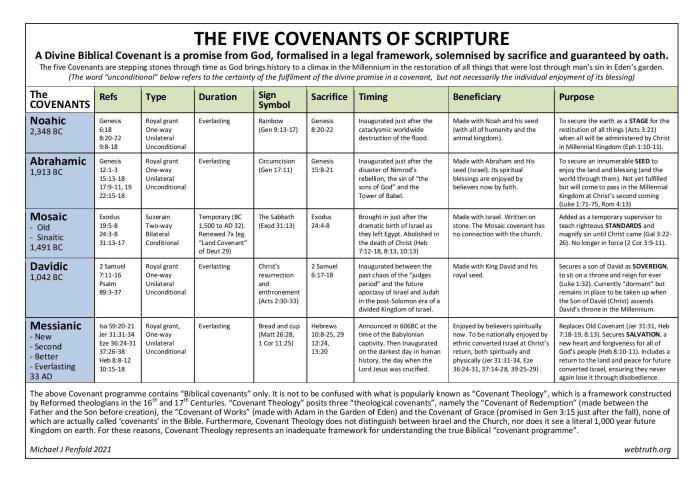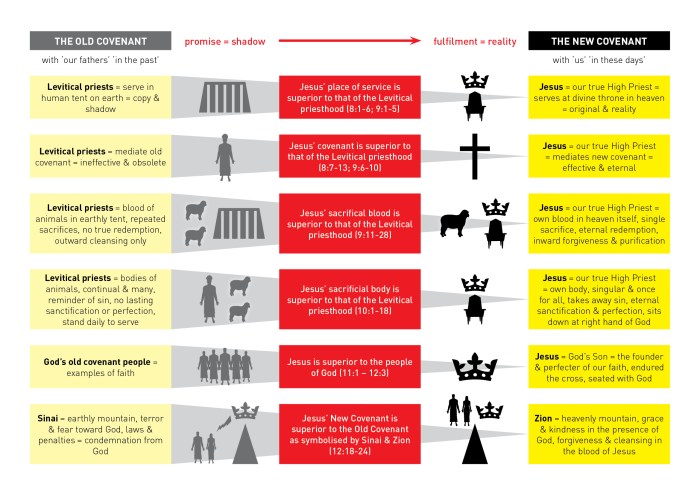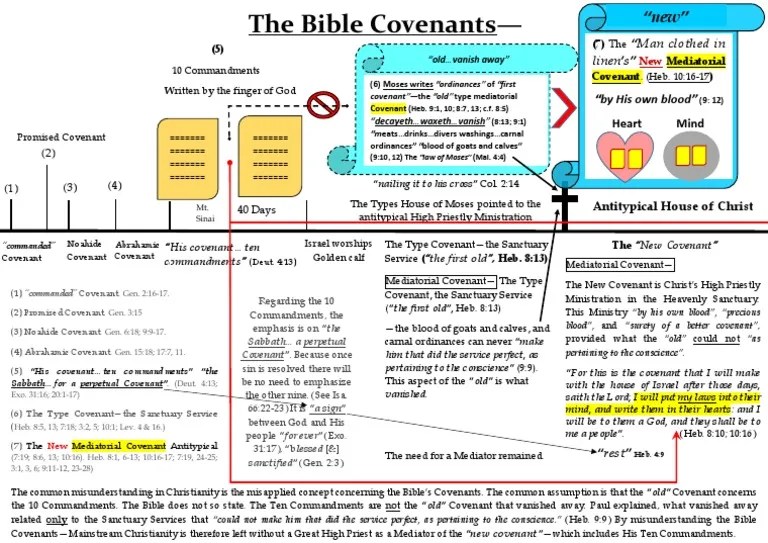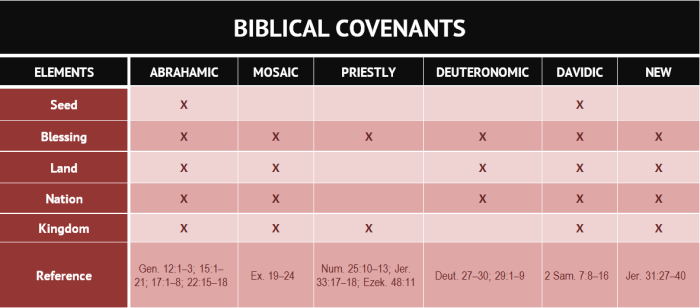Beginning with the covenants in the bible chart, the narrative unfolds in a compelling and distinctive manner, drawing readers into a story that promises to be both engaging and uniquely memorable. From the Abrahamic Covenant to the New Covenant established by Jesus Christ, these sacred agreements form the backbone of God’s relationship with humanity, shaping history, destiny, and the very nature of our faith.
As we delve into this captivating exploration, we will uncover the significance of each covenant, its role in God’s plan of salvation, and the profound implications for our lives today. Through a comprehensive examination of biblical texts and expert insights, this chart serves as an invaluable resource for anyone seeking a deeper understanding of God’s unwavering commitment to his people.
Covenant Types in the Bible

Covenant is a central theme in the Bible. It refers to a binding agreement between God and humanity or between God and specific individuals or groups. Throughout the biblical narrative, various covenants play significant roles, shaping the relationship between God and his people.
Categorization of Covenants
Covenants in the Bible can be categorized based on their nature and purpose:
- Unilateral Covenants:These covenants are established by God’s initiative and are not conditional on human obedience. They are often characterized by promises of blessing and favor.
- Conditional Covenants:These covenants are dependent on human faithfulness and obedience. If the conditions are not met, the covenant may be broken or nullified.
- Historical Covenants:These covenants record significant events or relationships in the history of Israel. They serve as a reminder of God’s faithfulness and his dealings with his people.
- Prophetic Covenants:These covenants foretell future events or blessings. They often involve promises of a Messiah or a future kingdom.
List of Covenants in the Bible
The following is a comprehensive list of covenants mentioned in the Bible:
- Covenant with Adam and Eve:A conditional covenant in the Garden of Eden (Genesis 1:28-30; 2:15-17).
- Covenant with Noah:A unilateral covenant after the flood, promising never to destroy the earth by flood again (Genesis 6:18; 9:8-17).
- Covenant with Abraham:A unilateral covenant promising land, descendants, and blessing (Genesis 12:1-3; 15:1-21).
- Covenant with Moses:A conditional covenant at Mount Sinai, involving the Ten Commandments and the law (Exodus 19:1-8; 20:1-17).
- Covenant with David:A unilateral covenant promising an eternal dynasty and a Messiah (2 Samuel 7:1-16).
- New Covenant:A unilateral covenant promised by Jeremiah, establishing a new relationship between God and his people, based on forgiveness and the indwelling of the Holy Spirit (Jeremiah 31:31-34).
Significance of Covenants
Covenants play a crucial role in the biblical narrative:
- Foundation of God’s Relationship with Humanity:Covenants provide the framework for God’s interaction with his people.
- Source of Blessing and Favor:Unilateral covenants bring blessings and favor upon those who receive them.
- Conditional Relationships:Conditional covenants highlight the importance of obedience and faithfulness in the relationship between God and humanity.
- Foretelling Future Events:Prophetic covenants provide glimpses into God’s plans and promises for the future.
- Basis for Hope:Covenants offer hope and assurance of God’s faithfulness and his commitment to his people.
Covenants in the Old Testament

Covenants played a pivotal role in shaping the religious and social landscape of ancient Israel. The Old Testament contains several significant covenants, each with unique implications and consequences.
The Abrahamic Covenant
The Abrahamic Covenant was a pivotal agreement between God and Abraham, recorded in Genesis 12-15. Through this covenant, God promised to bless Abraham and his descendants, making them a great nation and giving them the land of Canaan. In return, Abraham was to demonstrate his faith by following God’s commands and living in accordance with his ways.
- God promised to bless Abraham and his descendants.
- God promised to give Abraham the land of Canaan.
- Abraham was to demonstrate his faith by following God’s commands.
The Mosaic Covenant
The Mosaic Covenant was a comprehensive agreement between God and the Israelites, established at Mount Sinai after the Exodus from Egypt. It consisted of the Ten Commandments and a series of laws and regulations that governed the religious, social, and legal aspects of Israelite society.
The Mosaic Covenant served as a framework for the Israelites’ relationship with God and provided a roadmap for their daily lives.
- The Mosaic Covenant consisted of the Ten Commandments and a series of laws and regulations.
- The covenant governed the religious, social, and legal aspects of Israelite society.
- It provided a roadmap for the Israelites’ relationship with God and their daily lives.
The Davidic Covenant
The Davidic Covenant was a promise made by God to King David, recorded in 2 Samuel 7. God promised to establish David’s throne forever and to make his descendants rulers over Israel. This covenant held messianic significance, as it foreshadowed the coming of the Messiah, who would be a descendant of David and would establish an eternal kingdom.
- God promised to establish David’s throne forever.
- God promised to make David’s descendants rulers over Israel.
- The covenant held messianic significance, foreshadowing the coming of the Messiah.
Covenants in the New Testament

The New Covenant is the final and everlasting covenant established by Jesus Christ through his death and resurrection. It fulfills and transforms the Old Testament covenants, bringing a new relationship between God and his people.The New Covenant is based on the principles of grace and faith.
Unlike the Old Covenant, which was based on law and works, the New Covenant is not dependent on our ability to keep the law perfectly. Instead, it is based on the grace of God, who forgives our sins and gives us the power to live a righteous life.
Implications of the New Covenant for Believers Today
The New Covenant has profound implications for believers today. First, it gives us assurance of salvation. Through the New Covenant, we are forgiven of our sins and reconciled to God. We have the hope of eternal life and a future in heaven.Second,
the New Covenant empowers us to live a holy life. The Holy Spirit indwells believers, giving us the power to resist sin and live in obedience to God’s will.Third, the New Covenant creates a community of believers. We are united as one body in Christ, with a shared faith and a common purpose.
Covenant Themes and Motifs
Covenant relationships are a recurring theme throughout the Bible, shaping our understanding of God’s relationship with humanity. These covenants often share common themes and motifs that provide insight into the nature of God’s character and expectations.
One prominent theme is the idea of a binding agreement. Covenants establish a mutual obligation between God and his people, with specific terms and conditions. These agreements Artikel the responsibilities and expectations of both parties, creating a framework for a lasting relationship.
Divine Faithfulness
God’s faithfulness is a central motif in biblical covenants. He consistently fulfills his promises, even when his people fail to uphold their end of the agreement. This unwavering commitment demonstrates God’s steadfast love and reliability.
- In the covenant with Abraham, God promises to bless him and his descendants, regardless of their actions.
- In the covenant with Israel, God remains faithful despite their repeated unfaithfulness.
Human Obedience
While God’s faithfulness is unconditional, human obedience is also an essential aspect of covenants. God expects his people to keep their vows and follow his commands. This obedience is not merely a matter of legalism but an expression of love and trust in God.
- In the covenant with Noah, God requires obedience to his commands in order to establish a covenant of peace.
- In the covenant with Moses, the Israelites agree to obey God’s laws as a condition of the covenant.
Consequences of Faithfulness and Unfaithfulness
Covenants often include consequences for both faithfulness and unfaithfulness. God blesses those who uphold their commitments and punishes those who violate them. This reinforces the importance of obedience and the seriousness of covenant relationships.
- In the covenant with Abraham, God promises blessings for obedience and curses for disobedience.
- In the covenant with Israel, God threatens exile and destruction for unfaithfulness.
Covenant Renewal, Covenants in the bible chart
Despite the consequences of unfaithfulness, God often renews his covenants with his people. This renewal demonstrates his desire for reconciliation and his willingness to forgive those who repent. Covenant renewal also serves as a reminder of the ongoing nature of God’s relationship with humanity.
- After the Israelites break the covenant at Mount Sinai, God renews it through Moses.
- In the New Testament, the covenant with Israel is renewed through Jesus Christ.
Covenant and Salvation
Covenants play a pivotal role in God’s plan of salvation. They establish a framework for understanding God’s grace and mercy, and they provide a foundation for our faith.
Through covenants, God makes promises to His people and Artikels the conditions for His blessings. These promises include the forgiveness of sins, eternal life, and a relationship with God. In return, God expects His people to obey His commands and live according to His ways.
Covenants and Grace
Covenants demonstrate God’s grace and mercy. Even though we have sinned and fallen short of His glory, God offers us salvation through His covenants. He does not hold our sins against us, but instead extends His forgiveness and love to all who believe in Him.
Covenants and Faith
Covenants are also essential for faith. Faith is not merely a belief in God’s existence, but it is also a trust in His promises. When we enter into a covenant with God, we are trusting that He will keep His promises to us.
This trust is essential for our salvation, as it allows us to receive God’s forgiveness and grace.
Covenant and Worship
Covenants play a central role in shaping worship in the Bible. They establish a framework for understanding the relationship between God and his people, and they provide a context for expressing that relationship through worship practices.Covenants are not merely legal agreements; they are expressions of love and commitment.
They involve mutual obligations and responsibilities, but they are ultimately based on God’s grace and faithfulness. When we worship God in accordance with the covenant, we are acknowledging his sovereignty and our dependence on him. We are also expressing our love and gratitude for his salvation.
Worship in the Old Testament
In the Old Testament, worship was closely tied to the covenant relationship between God and Israel. The Israelites were commanded to worship God alone, and they were given specific instructions about how to do so. These instructions included the construction of the tabernacle and the temple, the establishment of the priesthood, and the development of a system of sacrifices and offerings.Worship
in the Old Testament was also communal. It involved the entire nation of Israel, and it was centered on the temple in Jerusalem. The people gathered together for regular festivals and sacrifices, and they sang songs and prayed to God.
Worship in the New Testament
In the New Testament, the emphasis on worship shifted from the temple to the heart. Jesus taught that true worship is not about external rituals and ceremonies, but about a genuine relationship with God. He said, “God is spirit, and those who worship him must worship in spirit and truth” (John 4:24).The
New Testament also emphasizes the importance of corporate worship. Christians are encouraged to gather together regularly for prayer, praise, and the study of God’s Word. Corporate worship is a way for us to express our unity as the body of Christ, and it is a time for us to be renewed and strengthened in our faith.
Conclusion
Covenants are essential for understanding worship in the Bible. They provide a framework for understanding the relationship between God and his people, and they shape the way we express that relationship through worship practices. Whether in the Old Testament or the New Testament, worship is ultimately about acknowledging God’s sovereignty, expressing our love and gratitude for his salvation, and living in a right relationship with him.
Covenant and Community: Covenants In The Bible Chart
Covenants play a vital role in establishing and maintaining community by creating a shared sense of purpose, values, and obligations. They foster a sense of belonging and unity, shaping the identity and relationships within a group.
Implications for Community Living
Covenant relationships have significant implications for community living, including:
- Mutual Responsibility:Covenants establish a sense of shared responsibility for the well-being and success of the community.
- Accountability:Covenants hold individuals accountable to their commitments, promoting integrity and trust within the community.
- Conflict Resolution:Covenants provide a framework for resolving conflicts peacefully and respectfully, maintaining harmony within the community.
- Shared Values:Covenants embody shared values and beliefs, shaping the culture and ethical standards of the community.
Covenant and Law

Covenants and law are inextricably linked in the Bible. Covenants provide a framework for understanding the purpose and function of law, while law serves as a means of maintaining covenant faithfulness.
While studying the covenants in the bible chart, I realized that I needed a little help with some math problems. Luckily, I found a helpful resource online: math for apes answer key . After solving those math problems, I was able to return to my study of the covenants in the bible chart with a clearer understanding.
Law as a Framework for Covenants
The law, as given in the Bible, is not an arbitrary set of rules and regulations. Rather, it is an expression of the covenant relationship between God and his people. The law defines the terms of the covenant, outlining the obligations and responsibilities of both parties.
For example, the Ten Commandments, given to Moses on Mount Sinai, are not merely a list of prohibitions. They are a reflection of the covenant relationship between God and Israel. They define the terms of the covenant, outlining the ways in which Israel is to live in faithfulness to God.
Law as a Means of Maintaining Covenant Faithfulness
The law also plays a vital role in maintaining covenant faithfulness. By outlining the consequences of breaking the covenant, the law provides a deterrent to sin. It reminds the people of God of the seriousness of their commitment and the need to live in accordance with the terms of the covenant.
Furthermore, the law provides a means for restoring covenant faithfulness when it has been broken. Through the sacrificial system, the people of God could make atonement for their sins and be restored to right relationship with God.
Covenant and Ethics
Covenants in the Bible have profound ethical implications. They establish moral obligations and shape how individuals and communities make ethical decisions.
Covenant relationships create a sense of accountability and responsibility. When individuals enter into a covenant, they commit to upholding the terms and conditions of that covenant. This commitment extends to ethical behavior, as covenants often include moral stipulations.
Ethical Implications of Covenants
- Obligation to Justice:Covenants establish a sense of fairness and justice, requiring individuals to treat others with respect and compassion.
- Respect for Authority:Covenants often involve relationships with superiors or authorities. They require individuals to respect and obey those in positions of authority, as long as their commands do not violate moral principles.
- Responsibility to Others:Covenants create a sense of community and mutual obligation. Individuals are responsible for the well-being of others within the covenant, including their physical, emotional, and spiritual needs.
- Moral Decision-Making:Covenants provide a framework for ethical decision-making. When faced with ethical dilemmas, individuals can refer to the terms of the covenant to guide their choices.
Covenant and Mission
Covenants play a pivotal role in shaping God’s mission in the world. They provide a mandate for mission and evangelism, calling God’s people to share the message of salvation with all nations.
Covenants and the Mission Mandate
God’s covenant with Abraham (Genesis 12:1-3) established a special relationship between God and the people of Israel. Through this covenant, God promised to bless Abraham and his descendants, making them a great nation and a blessing to all nations. This promise included a missional component, as God called Abraham to be a blessing to others by sharing his faith and the knowledge of the one true God.Similarly,
the covenant God made with Israel at Mount Sinai (Exodus 19-24) included a missional mandate. God called Israel to be a “kingdom of priests and a holy nation” (Exodus 19:6), tasked with witnessing to the nations about God’s character and ways.
Israel’s faithfulness to the covenant would result in blessings and prosperity, while unfaithfulness would bring consequences.
Implications for Missional Living
The implications of covenant faithfulness for missional living are profound. As God’s covenant people, we are called to live out the missional mandate by:* Proclaiming the gospel to all nations.
- Demonstrating God’s love and compassion through acts of service and justice.
- Building bridges with people of other cultures and faiths.
- Advocating for the poor and oppressed.
- Living as examples of God’s grace and truth.
By faithfully living out our covenant responsibilities, we participate in God’s mission of redemption and reconciliation in the world. We become agents of God’s love and grace, bringing hope and healing to a broken world.
FAQ Corner
What is the significance of the Abrahamic Covenant?
The Abrahamic Covenant established God’s promise to bless Abraham and his descendants, making them a great nation and a blessing to all nations. It laid the foundation for the nation of Israel and the coming of the Messiah.
How did the Mosaic Covenant shape Israelite society?
The Mosaic Covenant provided a comprehensive law code that governed every aspect of Israelite life, from religious rituals to social justice. It established the framework for a holy and distinct nation, setting them apart from the surrounding pagan cultures.
What is the central message of the New Covenant?
The New Covenant, established by Jesus Christ, is a covenant of grace that offers forgiveness of sins and a new relationship with God. It fulfills and transforms the Old Testament covenants, making salvation accessible to all who believe in Jesus.